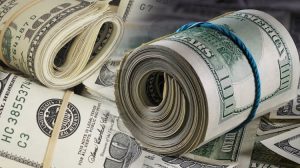 Over the past two weeks, the Central Bank of Nigeria, along with other banking institutions, has significantly increased the supply of dollars to the foreign exchange market, injecting a total of $2.5 billion.
Over the past two weeks, the Central Bank of Nigeria, along with other banking institutions, has significantly increased the supply of dollars to the foreign exchange market, injecting a total of $2.5 billion.
As a result, the Nigerian Naira has strengthened, reaching a rate of N1,309 against the United States dollar.
According to official data obtained from the FMDQ Securities Exchange, the closing exchange rate on Thursday stood at N1,309/$1, marking a slight improvement from the previous day’s rate of N1,300/$1. However, despite this positive trend, the Naira remains at its lowest level in eight weeks, although it continues to gain strength against the US dollar.
Trading activities were halted on Friday due to a public holiday.
Furthermore, forex transactions between willing buyers and sellers at the Nigerian Autonomous Foreign Exchange Market experienced a remarkable surge, reaching $857 million by the end of Thursday’s trading session. This represents the highest level since the implementation of the Central Bank’s new forex policies and the largest turnover recorded since 2021, surpassing the previous figure of $760 million on June 2nd, 2022.
Throughout March, the average daily forex turnover has hovered around $220 million, with this year’s daily average forex turnover amounting to $177 million.
The Central Bank of Nigeria made a total sale of $1 billion in the preceding week.
Analyzing the FX trading summary, the intraday high on Thursday closed at N1,392, rising from N1,460 per dollar on Wednesday. Conversely, the intraday low appreciated to N1,250 on Thursday, up from Wednesday’s closing rate of N1,200.
The improved liquidity in the forex market is attributed to a range of policies currently implemented by the Central Bank of Nigeria. These include the unification of exchange rate windows, liberalization of the FX market, clearance of FX backlog obligations for banks and airlines, implementation of a Price Verification System, imposition of limits on banks’ Net Open Position, removal of the daily cap of N2 billion on remunerable Standing Deposit Facility, and overhaul of the Bureau De Change segment.
Forex turnover serves as a crucial metric in the financial realm as it reflects the total value of all foreign exchange transactions completed within a specific timeframe, offering insights into the liquidity and vibrancy of the forex market. Higher turnover rates indicate a highly active market with numerous participants engaging in currency buying and selling, which can be indicative of investor confidence and economic stability.
On the official market front, the Central Bank of Nigeria initially addressed suspected cases of excessive foreign currency speculation and hoarding by Nigerian banks. Additionally, the apex bank recently announced the complete clearance of valid foreign exchange backlogs, settling obligations to bank customers by paying $1.5 billion, effectively resolving the residual balance of the FX backlog.
At the parallel market, the Naira continues to appreciate, with the US dollar currently selling at N1,280. Meanwhile, at the black market, the exchange rate ranges from N1,280 to N1,305, depending on the specific buyers and sellers, following the recent foreign exchange policy measures implemented by the Central Bank of Nigeria.

